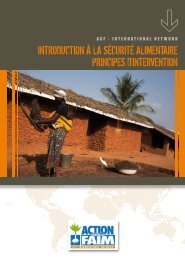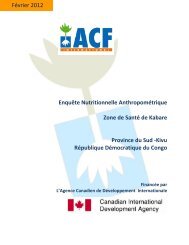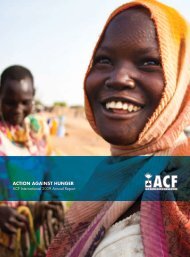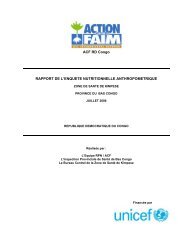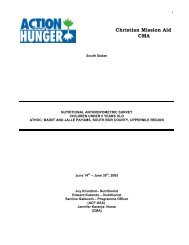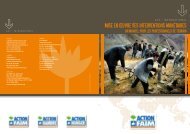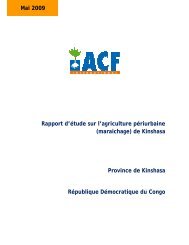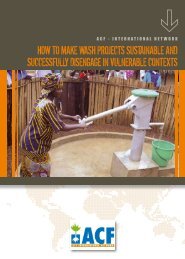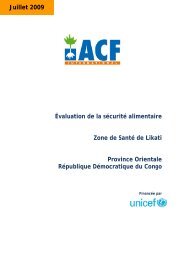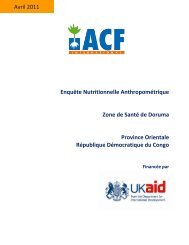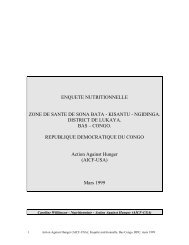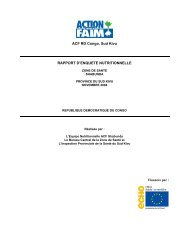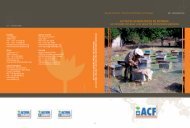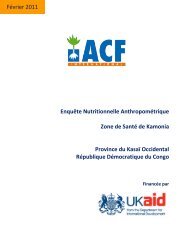Participatory Evaluation of our 2008 - Action Against Hunger
Participatory Evaluation of our 2008 - Action Against Hunger
Participatory Evaluation of our 2008 - Action Against Hunger
You also want an ePaper? Increase the reach of your titles
YUMPU automatically turns print PDFs into web optimized ePapers that Google loves.
Figure 11. Amount remaining in group bank account 8 months after programme closure<br />
300,000<br />
250,000<br />
200,000<br />
Ugx<br />
150,000<br />
100,000<br />
50,000<br />
0<br />
1 2 3 4 5 6 7 8 9 10 11 12<br />
Opejal Aceno Oyoro<br />
This vindicates the FFS programme and aspects <strong>of</strong> ACF’s 2009 FSL strategy to nurture household<br />
linkages with formal financial institutions. It is also interesting to notice that with the exception <strong>of</strong><br />
two groups in Opejal, the remaining balances within each geographic cluster are roughly<br />
equivalent. This probably reflects the individual influence <strong>of</strong> each <strong>of</strong> the three ACF facilitators<br />
toward how groups managed their contributions, expenditure, and savings (although all accounts<br />
require three separate signatures to ensure protection and transparency).<br />
Participant cash contributions and savings are another positive outcome <strong>of</strong> the FFS programme.<br />
Although the individual method varied between groups, all utilised some form <strong>of</strong> group asset<br />
building through membership and registration fees. All groups also supported individual savings by<br />
tracking and managing the contributions <strong>of</strong> each member (usually agreed amounts at agreed<br />
intervals, but otherwise based on ability to pay). Illustrative examples <strong>of</strong> member contribution<br />
schedules are useful:<br />
• Ugx 300/month/member (Kok Can Ikweri)<br />
• Ugx 200/week/member (Apit Pe Ool)<br />
• Minimum Ugx 500/week/member but maximum Ugx 1,000/week/member (Acan Dano), based<br />
on individual ability<br />
These are examples <strong>of</strong> a common collective practice called bole cap in Langi, wherein group<br />
members each contribute savings and maintain a shared ledger. The scheme <strong>of</strong>ten pays out at the<br />
end <strong>of</strong> the year (before Christmas), with each member receiving the total sum <strong>of</strong> their contributions.<br />
The bole cap can also be used for immediate cash needs, not solely for annual disbursements.<br />
The prevalence <strong>of</strong> FFS group bole cap saving schemes represents a significant accomplishment<br />
for the FFS programme that can also help inform other ACF programming in the North. It illustrates<br />
how a new initiative can integrate existing practices, perhaps even increasing their viability through<br />
improved record keeping skills or the collectively perceived benefits <strong>of</strong> working as a production<br />
group. It also demonstrates that access to savings is an important social and financial asset valued<br />
by returnee households.<br />
Analysis <strong>of</strong> how groups utilised the ‘pr<strong>of</strong>its’ <strong>of</strong> their commercial and study plots also illustrates the<br />
ability <strong>of</strong> programme activities to support livelihood strategies. The categories used for analysis are<br />
based on those developed by FAO, although they have been adapted because FAO used slightly<br />
different categories for the commercial and study plots whereas for this evaluation ACF wanted<br />
greater comparability by using the same criteria for both plots: 9<br />
9 See FAO Tables 24 and 28 for comparison.<br />
<strong>Action</strong> <strong>Against</strong> <strong>Hunger</strong> Uganda - 31 - Farmer Field School <strong>Evaluation</strong>



